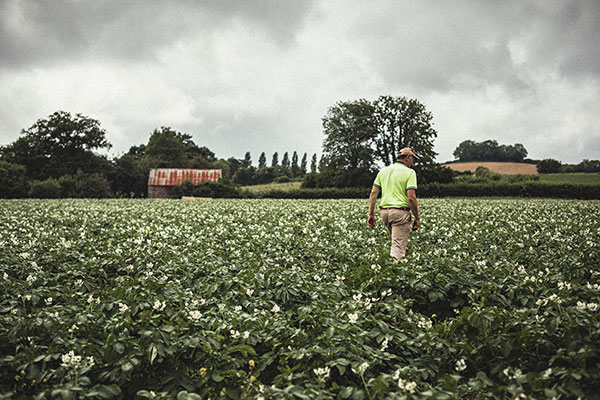A bright and dry September allowed our growers to harvest potatoes in ideal conditions; only the late-maturing and long-storing variety Valor is left in the ground.
After a fortnight of rain and gales, our soils are still dry at depth as we look to make a start on carrots and parsnips. There is a smug satisfaction in the knowledge that our barns are full to bursting with roots, squash, pumpkins and onions, which will be stored for use in our boxes over the winter. In the fields, green manures (such as rye and vetch) are sown and establishing well, to cover the soil protectively and soak up the soluble nutrients that would otherwise be lost in the winter rains.
We’ve seen a huge increase in demand since Covid-19 changed everything in March, stretching our supply chain at all points: packing, storage, delivery, IT and, of course, growing. Amid the immediate challenges of increased demand and changing working practices, I am immensely grateful to our crop programming team; with extraordinary prescience, they calmly set about increasing the volumes we had planned with existing growers, as well as searching out a few new organic growers at home and abroad.

With planting already underway, growers answered with a remarkable flexibility and responsiveness that would never have been possible without the trust built up over years of honouring our promises. So far it looks as if our team got it pretty much right – bar a weather or Brexit catastrophe, we are not envisaging substantial gaps this winter.
The exercise, along with the rigours of B Corp certification, has led us to look more formally at who we buy from, and why; what we can reasonably expect from them; and what they should expect from us. Sadly, all too often, commercial and ethical considerations pull in opposite directions. The challenge is to maximise the benefits of close, long-term relationships with growers we like and trust, in order to counterbalance what we lose through our approach: some of the benefits of scale, and the naked, short-termist competition that can lower prices.
Happily, the process has shown that this is a challenge we are all up for. Riverford may not always be the quickest at responding to changing customer desires, but perhaps my greatest pride is that we are extraordinarily reliable and fair, to customers and to suppliers. I hope that makes the parsnips more enjoyable as you scrub off the mud.












0 Comments